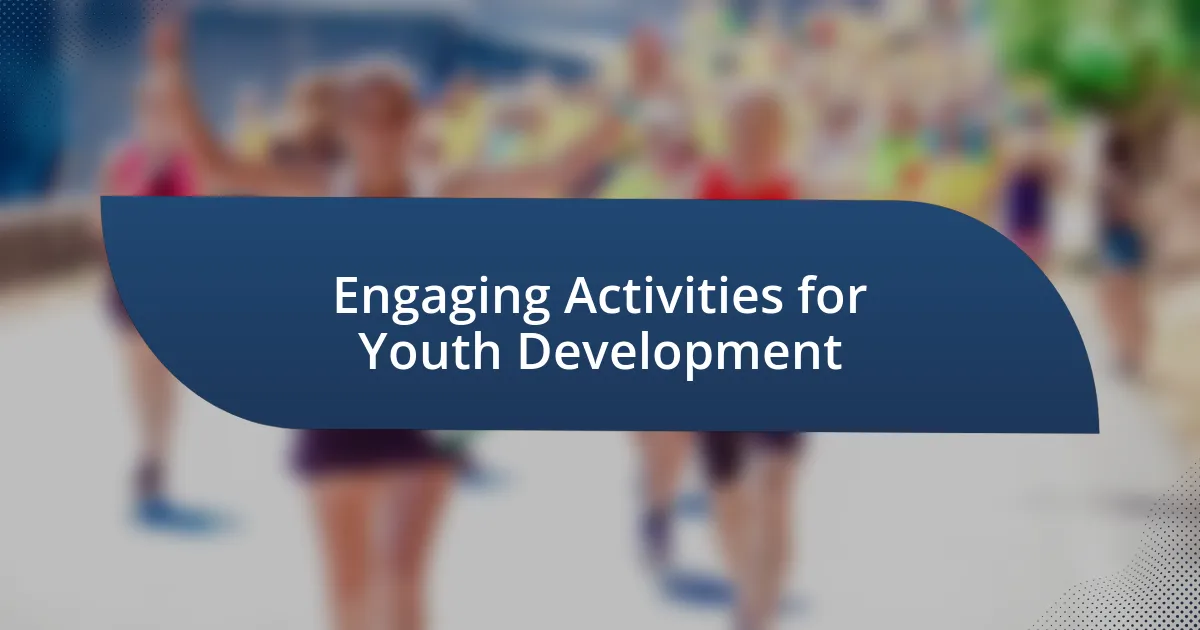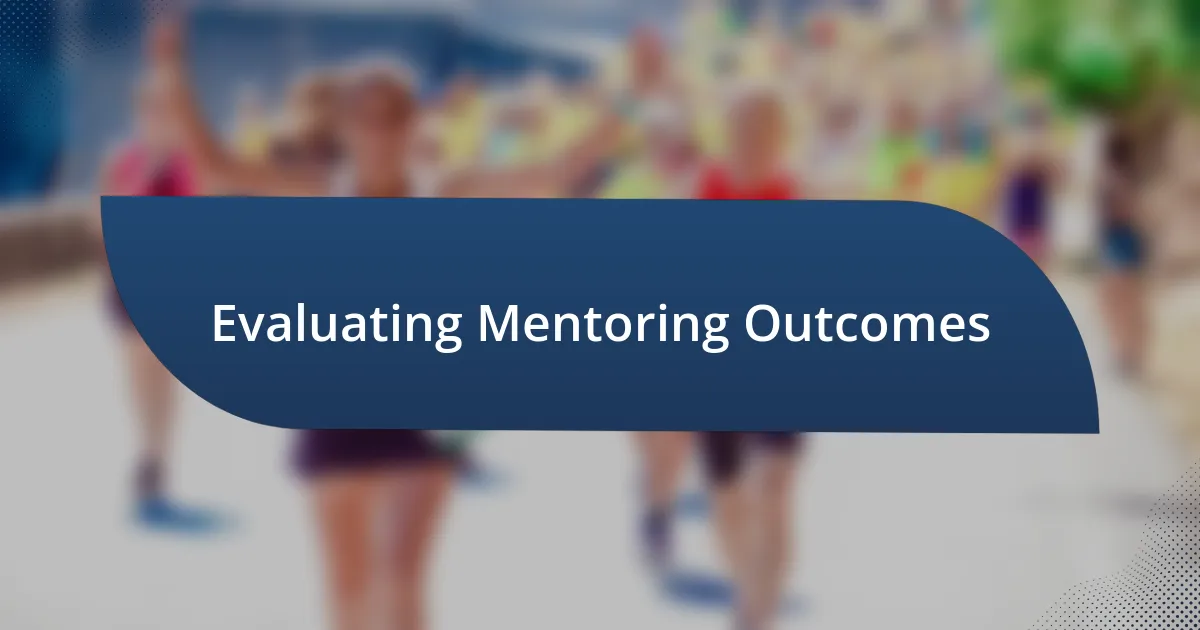Key takeaways:
- Empathy and adaptability are essential qualities for effective mentoring, fostering trust and support for mentees.
- Involving mentees in goal-setting using the SMART criteria empowers them and fosters ownership of their objectives.
- Engaging activities, such as community projects and creative workshops, enhance youth development by building teamwork and self-expression.
- Evaluating mentoring outcomes through feedback and tracking progress strengthens the mentoring relationship and measures emotional growth.

Key Qualities of Effective Mentors
Empathy stands out as one of the most crucial qualities of an effective mentor. I recall a particular instance where a young mentee was struggling with self-esteem issues. By putting myself in their shoes and sharing my own experiences with insecurity, I not only built trust but also helped them feel truly understood. Isn’t it incredible how a simple act of listening can transform someone’s perspective?
Another key quality is adaptability. Each youth I’ve worked with has unique challenges and strengths. I had a mentee who thrived in a structured environment but struggled when things were unpredictable. By adjusting my approach, I created a more supportive atmosphere, allowing them to flourish. Have you ever witnessed the power of flexibility in mentoring?
Lastly, establishing clear communication fosters a healthy mentoring relationship. I’ve found that regularly checking in and asking open-ended questions encourages my mentees to express themselves. One time, a brief, casual chat led to a deeper conversation about their goals and fears, revealing a lot more than I anticipated. Isn’t it fascinating how transparent communication can unlock potential?

Building Trust with Youth
Building trust with youth is foundational to effective mentoring. I’ve learned that being genuine creates a safe space for young people. There was a moment when I accidentally shared a personal failure while discussing challenges. Instead of feeling vulnerable, I discovered it opened the door for my mentee to discuss their own fears, solidifying our bond. The lesson? Authenticity encourages openness.
Here are some strategies I’ve found effective in building trust:
- Be Consistent: Regular meetings help establish reliability.
- Listen Actively: Show genuine interest in their stories and feelings.
- Share Experiences: Relating personal anecdotes makes me more relatable.
- Respect Boundaries: It’s crucial to honor their comfort levels.
- Encourage Honesty: Create an environment where they feel safe to express themselves.
These practices have helped me forge deeper connections, making it easier for youth to share their thoughts and concerns.

Setting Goals with Mentees
Setting goals with mentees is a crucial step in the mentoring process. From my experience, involving them in the goal-setting process not only empowers them but also fosters a sense of ownership. I once helped a mentee set a goal to improve their grades. Initially, they were hesitant, but when we broke it down into smaller, achievable tasks, the excitement in their eyes was unmistakable. That moment taught me the importance of crafting clear and attainable objectives together.
Another impactful practice I’ve adopted is using the SMART criteria for goal setting, which stands for Specific, Measurable, Achievable, Relevant, and Time-bound. This approach helps mentees gain clarity and focus on what they want to achieve. I vividly remember a session where my mentee set a specific goal to join the school debate team. By outlining measurable steps, like practicing twice a week, we both felt more excited and committed to the journey ahead.
Lastly, regularly revisiting these goals and adjusting them as needed is essential. One time, after a couple of months of progress, my mentee found their initial aspirations had evolved. We updated their goals to match their newfound interests, which reignited the enthusiasm they initially had. This adaptability not only keeps the mentoring process engaging but also highlights growth, showing that goals can change as they do.
| Goal-Setting Strategy | Description |
|---|---|
| Involvement | Empower them by involving mentees in setting their own goals. |
| SMART Criteria | Utilize Specific, Measurable, Achievable, Relevant, and Time-bound frameworks. |
| Regular Review | Periodically revisit and adjust goals to align with changing interests. |

Engaging Activities for Youth Development
Engaging activities are vital in fostering youth development, and I’ve found incorporating hands-on projects to be incredibly effective. For example, I organized a community garden initiative that allowed my mentees to work together, grow vegetables, and learn about sustainability. Witnessing their pride as they harvested their own produce was a revelation; it showed me how such experiences can build teamwork and a sense of responsibility in young people.
I often also tap into creative outlets like art or music workshops. During one memorable session, we hosted a mural painting project that not only beautified our local space but also gave the youth a platform to express their stories. Their enthusiasm was contagious! It demonstrated how creative activities can foster self-expression, and ultimately, strengthen their self-esteem.
Another interesting approach I’ve adopted is mentorship through sports. Believing in the power of teamwork and discipline, I started a weekly basketball clinic for my mentees. The lessons learned on the court—like resilience and collaboration—often translate into their everyday lives. Have you seen how a simple game can reveal so much about personal growth and camaraderie? It’s extraordinary how these engaging activities create lasting bonds and invaluable life lessons for young people.

Overcoming Common Mentoring Challenges
One common challenge I’ve faced as a youth mentor is gaining the trust of my mentees. I remember a particular time when I first met a group of teens who were understandably skeptical and reluctant to open up. I decided to share some of my own experiences, particularly my struggles as a teenager, which helped me break the ice. By being vulnerable, I created an environment where they felt safe to share their thoughts and feelings.
Another hurdle is balancing the mentoring relationship with setting boundaries. I learned quickly that while it’s crucial to be approachable, I had to maintain a level of professionalism. For instance, there was a time when a mentee repeatedly reached out late at night for advice. I knew I had to address this directly, so I established clear guidelines on communication while reassuring them that I cared about their well-being. Striking this balance is essential to foster respect and understanding in the relationship.
Lastly, addressing conflicts among mentees can be quite challenging. During one youth retreat, two mentees had a disagreement that escalated into a heated argument. Instead of stepping in immediately, I encouraged them to express their feelings first. I found that facilitating a dialogue where they both could articulate their perspectives not only resolved the conflict but also taught them valuable conflict-resolution skills. Have you ever witnessed how open communication can transform a situation? It truly has a profound impact on the group dynamic.

Evaluating Mentoring Outcomes
Evaluating the outcomes of mentoring relationships is a critical step to understand what works and what doesn’t. In my experience, I often set specific goals at the outset, both for myself and my mentees. I remember a mentee who wanted to improve her grades; we tracked her progress weekly, celebrating small wins together, which kept us motivated. Reflecting on these objectives not only helps in measuring success but also strengthens the bond of mentorship.
One aspect I’ve found effective is soliciting feedback from my mentees. During one of our sessions, I asked my mentee how she felt about our meetings. Her candidness not only surprised me but also revealed areas where I needed to adapt my approach. Have you ever considered how powerful it is to receive direct insights from those you mentor? I believe this exchange fosters a mutual growth environment that’s invaluable.
Additionally, I’ve discovered that evaluating outcomes goes beyond academic or skill achievements; it encompasses emotional and social growth as well. I distinctly recall a mentee who initially struggled with self-confidence. Through our work together, I witnessed her transformation into a more assertive individual, confidently speaking up in group settings. Looking back, it’s moments like these that truly affirm the impact of mentoring—how do we measure that kind of success? For me, it’s in the glow of their newfound confidence and the strides they take toward their futures.




